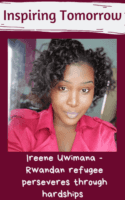This month we commemorate World Refugee Day. Imagine packing up your entire life to move to a new country that you know nothing about. Imagine never seeing family and old friends because you do not have the financial means to do so. Imagine being unable to communicate with those around because you don’t know the language. This is the reality for Ireene Uwimana, a young woman from Rwanda.
Adapting to South Africa
Ireene moved to South Africa when she was only 10 years old. They left Rwanda because her parents were seeking a better life elsewhere. She describes adapting to the cultures of South Africa as rather difficult as there are so many cultures, but with the help of some people they were taught how to cook certain dishes and how things in general were done here. But there were also people who didn’t pay attention and looked the other way.
The language barrier was another challenge to adapting in South Africa. Ireene was bullied at school when she was younger because she didn’t understand anything.
“I remember when I started going to school in grade 5 when we just got here and I didn’t speak English my classmates used to make fun of me every time and swear me out in English and Afrikaans and they would all laugh because they knew I didn’t understand any of it.”
Ireene expresses that she misses home, but not that much as she was still quite young when she left. She misses her relatives and the friends she made while there. From what she can remember Rwanda is a small country, yet peaceful. Rwanda was still recovering from a violent civil war, so the economy and the education system wasn’t in a good place.
Challenges
Ireene considers both Rwanda and South Africa as her home despite the challenges that South Africa poses. She explains that being a refugee is not something that she’d wish upon anyone.
“Not having proper ID documents is one of the most difficulties that we have faced here as a family because we are still using the asylum seeker documents as ID. It allows us to study and work in south Africa but at the same time we are limited to certain services offered by government, for example I cannot have government bursaries to help out with tuition fees because I am not a citizen.”
She explains some other challenges that her and her family have experienced. There are certain jobs that they do not qualify for because they’re not South African citizens, and the most difficult thing has been xenophobia.
“And on top of it you get hard times like xenophobia where your life is threatened and there’s nothing you can do about it.”
Xenophobia affects Ireene in a way that she simply cannot live in peace and sometimes she is filled with panic, which makes her think that maybe South Africa isn’t really her home.
Desire to work with people
Ireene has a desire to work with people and she thinks this passion stemmed from the kindness that was shown to her and her family when they were struggling when they first arrived in South Africa. There were some people who helped them and took them in, gave them food and clothes when they didn’t have any, and simply made sure that they were okay.
“… they were very kind to us although we were a very big family but they still looked after us and so I also wanted to do the same for other people.”
Words of advice
Ireene’s life lesson is: “Choose your friends wisely because people can build you or destroy you. The other is that no matter how hard things get never give up on what you believe or your dreams and always be good to other people because you never know when you may need them in future.”
***
Read more here on a refugee who has a passion for swimming.
Tell us: What life lesson did you learn from Ireene?






 wake your self up and chase your dreams!
wake your self up and chase your dreams!